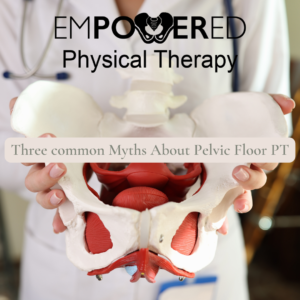Debunking Common Myths About Pelvic Floor Physical Therapy
Pelvic floor physical therapy (PT) is a specialized area of healthcare focused on the muscles, ligaments, and connective tissues in the pelvic region. Despite its importance, it’s often surrounded by myths and misconceptions that may prevent people from seeking the help they need:
Myth 1: Only Women Who Have Had Children Need Pelvic Floor PT
FALSE!!
Pelvic floor dysfunction can affect anyone—men, women, and even children. Here are some reasons why someone might need pelvic floor PT:
- Urinary or Fecal Incontinence: If you experience leaks when you laugh, cough, or sneeze, pelvic floor PT can help strengthen/coordinate the muscles to prevent this.
- Pelvic Pain: Chronic pelvic pain, which might be due to tight or spasmed pelvic floor muscles, can be alleviated through specialized therapy.
- Pelvic Organ Prolapse: When organs like the bladder, uterus, or rectum drop and press into the vaginal wall, pelvic floor PT can help manage and reduce symptoms.
- Pain During Intercourse: Pelvic floor dysfunction can lead to discomfort or pain during sex, and therapy can help improve this.
- Pre- and Post-Surgery: Preparing for or recovering from pelvic surgeries, such as prostatectomy or hysterectomy, can benefit greatly from PT.
- Postural and Core Stability Issues: The pelvic floor is integral to your core, so issues here can affect your posture and stability.
- Pregnancy and Postpartum: Pelvic floor PT helps prepare the pelvic muscles for childbirth, reducing the risk of complications and pain during delivery. Postpartum, pelvic floor PT aids in the recovery process by strengthening weakened muscles, addressing incontinence, and alleviating pelvic pain, as well as facilitating a smoother return to daily activities.
Myth 2: Kegels Are the Answer to All Pelvic Floor Problems
FALSE!!
Kegels are often touted as the magical solution to any pelvic floor problem. However,
are not a one-size-fits-all solution. In fact, doing Kegels incorrectly or when they aren’t appropriate can sometimes make the problem worse. At pelvic floor PT, your treatment plan is tailored to your specific needs, which may include manual therapy, lifestyle and dietary modifications, bladder training, and a customized functional exercise program. For some people, Kegels are beneficial, but for others, different strategies are needed.
Myth 3: Pelvic Floor Issues Are Rare
FALSE!!
When pelvic floor issues are experienced, many people feel isolated and embarrassed. Despite the topic often being considered taboo, pelvic floor issues are surprisingly common and are experienced by a wide and varied population. Research shows that about one in three women and up to one in eleven men will experience some form of pelvic floor dysfunction in their lifetime.
Despite its prevalence, many people feel embarrassed to discuss these issues with their healthcare providers, leading to underreporting and a lack of awareness.
Common pelvic floor issues include:
- Urinary incontinence: The involuntary leakage of urine.
- Fecal incontinence: The inability to control bowel movements.
- Pelvic organ prolapse: When pelvic organs, such as the bladder or uterus, descend into or outside of the vaginal canal.
- Chronic pelvic pain: Persistent pain in the pelvic region.
- Sexual dysfunction: Painful intercourse or other sexual issues.
Pelvic floor PT can help manage and alleviate these symptoms, improving the quality of life for those affected. Early intervention and education are crucial in addressing pelvic floor dysfunction effectively.
Pelvic floor physical therapy is a valuable treatment option for a wide range of individuals, not only women who have had children. And while Kegels can be helpful, they are not a universal solution. Pelvic floor issues are more common than many people think, and by debunking these myths we hope to encourage more people to seek the help they need and start a conversation about the importance of pelvic health.
If you or someone you know is experiencing symptoms of pelvic floor dysfunction, don’t hesitate to reach out to us at Empowered Physical Therapy! The right support and treatment can make a world of difference!

